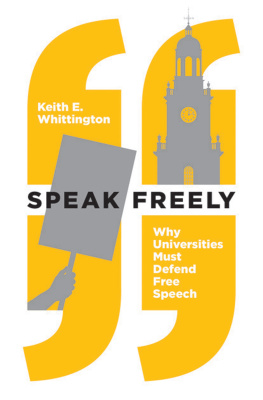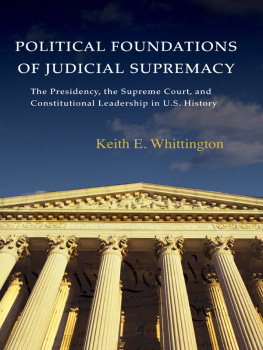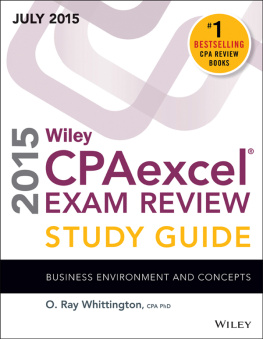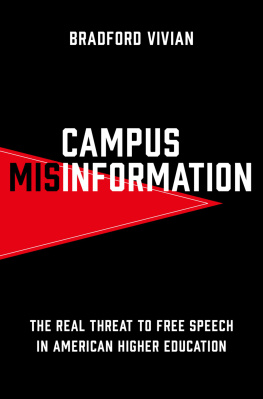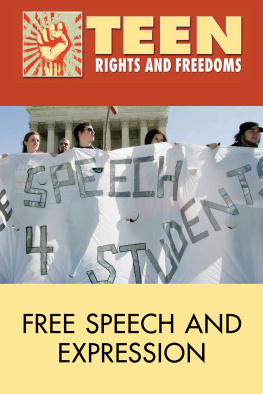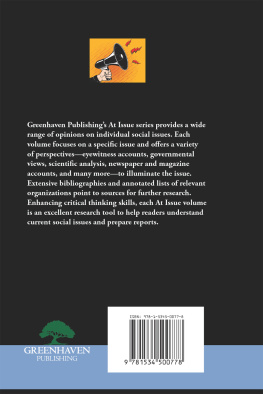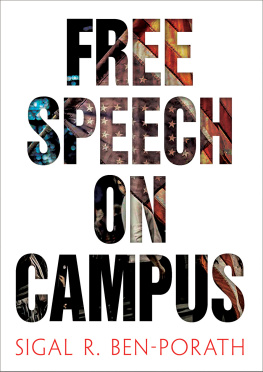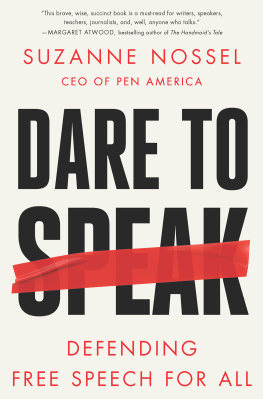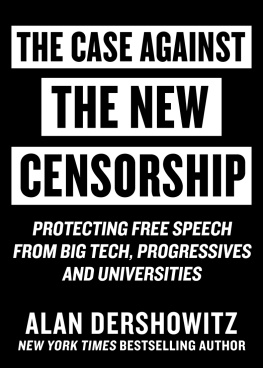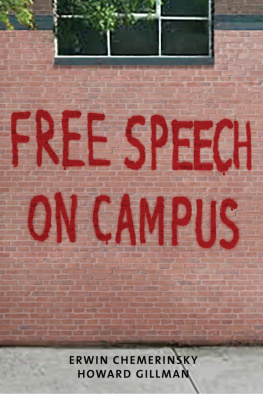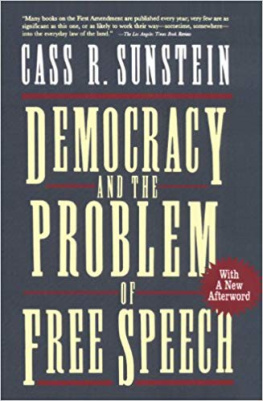
SPEAK FREELY

| New Forum Books Robert P. George, Series Editor |
Speak Freely
Why Universities Must Defend Free Speech
Keith E. Whittington
PRINCETON UNIVERSITY PRESS
PRINCETON AND OXFORD
Copyright 2018 by Princeton University Press
Published by Princeton University Press,
41 William Street, Princeton, New Jersey 08540
In the United Kingdom: Princeton University Press,
6 Oxford Street, Woodstock, Oxfordshire OX20 1TR
press.princeton.edu
Jacket image: TaniaLuz / iStock Photo
All Rights Reserved
ISBN 978-0-691-18160-8
Library of Congress Control Number: 2017958751
British Library Cataloging-in-Publication Data is available
This book has been composed in Adobe Text Pro and Gotham
Printed on acid-free paper.
Printed in the United States of America
10 9 8 7 6 5 4 3 2 1
For my teachers, colleagues, and students
CONTENTS
PREFACE
I have made my professional home within academia, and I am immensely grateful for the opportunities that universities have provided me. I am unabashedly an advocate for universities and their place in American life. I am hardly oblivious to the many flaws that can be found in academia, but it saddens me to see them vilified by outsiders who often do not understand (or at least act as if they do not understand) what universities do and how they operate, and subverted by insiders who sometimes do not appreciate the value and fragility of these institutions.
My fit within academia has not always been a natural one. My entry into the great universities on the East Coast put me in touch with my inner Texas populist. My political inclinations might be charitably called outside the mainstream of university faculty. My orientation toward the discipline of political science is from the margins. But I have been fortunate in finding welcoming colleagues, teachers, and friends who exemplify scholarly ideals and who have repeatedly renewed my faith in and passion for the academic life, and I have been lucky to work with students who are thoughtful, interesting, and engaged. I hope that others find universities as welcoming and as stimulating for generations to come, and I hope this book can make a modest contribution toward preserving these great American institutions for future generations of students and faculty.
As I write this, students mix with outside agitators in violent protests to silence and threaten conservative speakers at Berkeley, New York University, and Middlebury College. Universities that should stand as bastions of open dialogue and free speech have too often become sites of intolerance and intimidation. Recent years have brought a steady drumbeat of news reports of speakers disinvited or shouted down, of faculty harassed or investigated, of students disciplined or shunned, of signs and displays removed or destroyed. Rather than serving as exemplars of civil engagement among those holding different views and of rational examination of competing ideas, American college campuses have too often become sad displays of excessive ideological polarization and repressive thought control. These are not just problems on one side of the political spectrum. They have become endemic to university life, and the tools of censorship are routinely taken up by all sides in campus debates. The strident insistence that disfavored views be squelched can and has come from any constituency. Unfortunately, these troubles are not confined to just a few campuses. Institutions across the United States have faced their own controversies, and universities in countries spread around the globe are confronting their own challenges in carving out or preserving a protected space for free inquiry into socially and politically controversial subjects. Indeed, American universities remain far better situated in this regard than universities in many other nations around the world.
The debates over the scope and limits of free speech on campus are not matters of concern only to the campus community. A generation ago, as the Soviet empire fell, the model of liberal capitalist democracy was ascendant. The United States stood as the oldest and most prominent example of that ideal put into practice and shone like the proverbial city upon a hill, The current crisis of free speech on college campuses is both symptom and cause of a larger threat to the maintenance of liberal democracy itself.
It would be a mistake to be overly complacent about American public support for civil liberties, including free speech, but we should also be cautious about rushing into excessive pessimism about the current generation of college students. It has been a routine finding in the public opinion literature going back decades that Americans express high levels of support for the freedom of speech in the abstract, but when they are asked about particular forms of controversial speech, that support begins to melt away. In the middle of the twentieth century, for example, one study found that more than three-quarters of a sample of lawyers thought that university students should have the freedom to invite controversial speakers to campus, but less than half of the general public agreed. Public support for the freedom of speech has not always stood firm, and campus debates over the scope of free speech are likely to have large consequences for how Americans think about these issues in the future.
In the months after the federal Constitutional Convention of 1787, Thomas Jefferson wrote to James Madison with some criticisms of the conventions work. From his diplomatic perch in Paris, Jefferson urged his friend to support the inclusion of a bill of rights in the new constitutional text. The anti-Federalists were saying the same thing, and using the absence of a declaration of rights as reason enough for refusing to ratify the proposed Constitution. Madison thought such objections were misguided, if not hypocritical, and doubted that such parchment barriers would do much good if government officials or the people themselves turned their backs on liberty. Nonetheless, Madison was willing to grudgingly admit that a bill of rights might be useful, even in a republic where the people Liberal tolerance and civil deliberation are foundational to the campus community as they are to the political community, and ultimately depend on the sentiment of community members. We sometimes need reminders of our fundamental maxims of free society, and I hope to provide such a reminder here.
I am thankful to those who were able to offer helpful responses to this work, and in particular to Donald Downs, Chris Eisgruber, Ben Johnson, Ken Kersch, Susan McWilliams, David Rabban, Jeffrey Rosen, Reed Silverman, Geoffrey Stone, and George Thomas. I am grateful to David Ramsey and the University of West Florida for the invitation to speak that launched this book, and for the welcoming venue they provided for the free exchange of ideas.
SPEAK FREELY
Introduction
Neither the entire police force available in Berkeley nor the presence of watchful professors could keep in check the riotous undergraduates of the University of California who had gathered in anticipation of the appearance of a controversial social activist. The local press and university officials had called for the lecture to be canceled, in light of disturbances that had occurred on other campuses, and there had been arrests in the past for disturbing the peace. Nonetheless, an enterprising student had extended the invitation and made the arrangements. The speaker had tried to circumvent the protesters by arriving on campus an hour before the announced time and sneaking into the auditorium where the scheduled talk was to be delivered. The immense crowd of protesters soon figured out that they had been duped, descended on the lecture hall, and noisily demanded that the speaker come out and face them. Instead, the speech went forward with the ticketed audience inside, and the demonstration dangerously approached a riot at several stages in the proceedings. The The activist was not the alt-right provocateur Milo Yiannopoulos in the spring of 2017, but the prohibitionist provocateur Carrie Nation in the spring of 1903.
Next page
